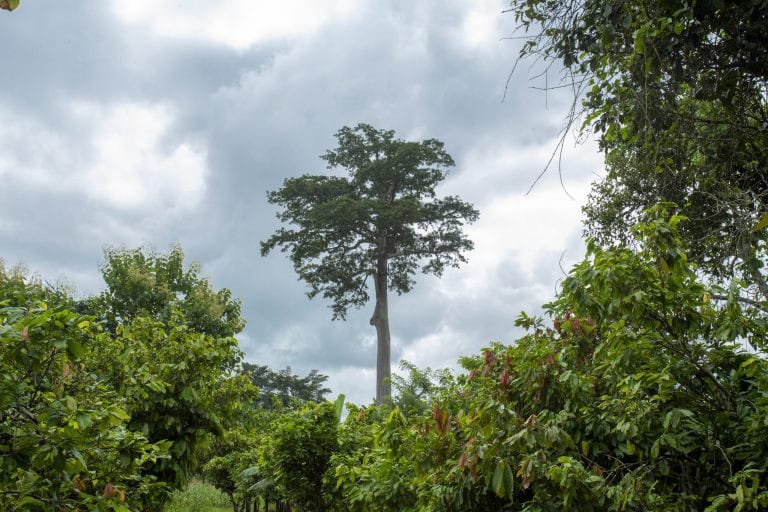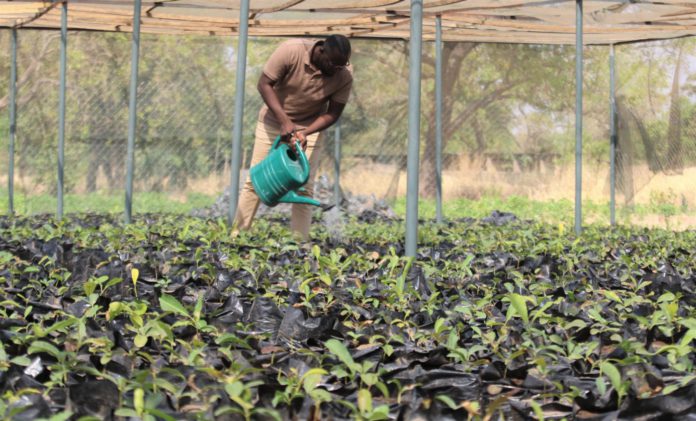Ghana Cocoa Board (COCOBOD) is planting over 1.6 million forest trees in the 2020/2021 cocoa crop year on cocoa farms across the country and also as part of its National Cocoa Rehabilitation Programme.
COCOBOD is embarking on the rehabilitation programme to replace about 40% of the country’s cocoa tree stock which are either overaged or affected by the Cocoa Swollen Shoot Virus Disease (CSSVD). The farms undergoing rehabilitation are being replanted with high yielding, early bearing and disease-tolerant hybrid seedlings developed by the Cocoa Research Institute of Ghana (CRIG).
For the 2020/2021 crop season, the Seed Production Division (SPD) of COCOBOD has produced 92 million seedlings for distribution to farmers across the country for planting. These are estimated to be planted on about 83,636.36 hectares of cocoa farms which include CSSVD treated farms, over-aged and moribund cocoa farms undergoing rehabilitation, filling of vacancies in existing young farms, among others.
It is for this reason that COCOBOD has made it mandatory for the planting of temporary shade crops and permanent shade trees on all farms before the cocoa seedlings are transplanted. While the temporary shade crops protect the young trees against the sun, thereby, facilitating high survival rates, the permanent trees, all of which are forest trees, provide shades and good temperature for the adult trees.

On average, about 20 economic trees are planted on every hectare of cocoa farm with 1,100 cocoa seedlings. In the same way that cocoa seedlings are nursed and supplied free of charge to farmers, these shade trees are also provided by COCOBOD free of charge for planting. Thus, with the estimated 83,636.36 hectares of cocoa farms being replanted for the 2020/2021 crop year, about 1,672.727 forest trees are being planted alongside the cocoa seedlings. This signifies the important role of the cocoa business in protecting our environment, ensuring a sustained green Ghana and promoting afforestation.
The Government of Ghana intends to plant five million trees on the 11th of June 2021 across the country as an initial programme under the Green Ghana Project. Ghanaians are being mobilised all over the country to plant trees on that day and nurture them to maturity as a way of contributing to the preservation of the environment.
In a statement expressing support for the project, the Chief Executive of COCOBOD, Hon Joseph Boahen Aidoo, said “a Green Ghana is essential for the cocoa industry. This is why our farmers are taught how to practice agroforestry to protect our biodiversity because the cocoa tree itself is a forest tree and it grows in harmony with the rest of the vegetation. The cocoa trees are also a means for carbon sequestration which has become crucial in these times, as we experience changes in our climate. It is also the policy of the Board that no farmer in any part of the country enters a protected forest for cocoa farming.
“As we celebrate Green Ghana Day, let us all reflect on the benefits of the ecosystem and work towards its preservation.
“There are an estimated 850,000 cocoa farmer households across the country. We urge our District officers, technical staff and community extension agents to encourage and mobilize them to take part in the exercise. If every farmer is able to plant at least 5 trees on the day and nurture them, cocoa farmers alone will be contributing about 4,250,000 trees to the Green Ghana Project, in addition to the more than 1.6 million being planted under the Cocoa Rehabilitation Programme. All other stakeholders on the cocoa value chain who may have the opportunity, are encouraged to plant a tree on the day and nurture it to maturity.
“The Green Ghana Project is indeed a laudable initiative which needs the support of all.”

